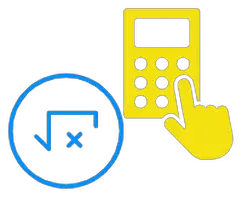Square root of 20
If you are curious about the square root of 20, it is approximately 4.472136. The square root of a number (20 in this case) is a value (4.472136 in this case) that, when multiplied by itself, equals the original number (20). Mathematically, the square root of 20 can be expressed in either radical or exponent form:
-Radical form of the square root of 20: √20
-Exponent form of the square root of 20: 20^(1/2) or 20^(0.5)
The notation √ is widely recognized as the radical sign or radix symbol. The value for which the square root is being determined is known as the radicand, which is located underneath the radical sign or radix.
-Radical form of the square root of 20: √20
-Exponent form of the square root of 20: 20^(1/2) or 20^(0.5)
The notation √ is widely recognized as the radical sign or radix symbol. The value for which the square root is being determined is known as the radicand, which is located underneath the radical sign or radix.
Calculator for Square Root of 20
If you want to calculate the square root of a number, including the value of the square root of 20, you can use a square root calculator.
Square Root Calculator
Calculation Guide of Square root of 20
In the following sections we explain how to calculate the square root of 20. We will address frequently asked questions, such as "Is the square root of 20 a rational or irrational number?" and “is 20 a perfect square?” The main topic we will be discussing is the square root of 20.
You will find all the information you need on the square root of 20 calculations below.
You will find all the information you need on the square root of 20 calculations below.
What is the square root of 20?
The square root of 20 is a number which multiplied by itself equals 20. Therefore, the square root of 20 is approximately 4.472136 and we write it √20 = 4.472136 because 4.472136 x 4.472136 = 20.
Therefore,
ANSWER: Square root of 20 = √20 = 4.472136
Therefore,
ANSWER: Square root of 20 = √20 = 4.472136
Is 20 a Perfect Square?
A perfect square is a number that results from multiplying a whole number (also known as an integer) by itself. Whole numbers include 0, 1, 2, 3, 4, 7, 8, and 9, while numbers such as -5, 7.025, or 5 ½ are not considered whole numbers. To illustrate, 81 is a perfect square because it is the product of 92, which is 9 multiplied by itself. Note that 9 is a whole number (integer).
In our example the square root of 20 is approximately 4.472136. Since 4.472136 is not a whole number, therefore 20 is not a perfect square.
ANSWER: 20 is not a perfect square.
In our example the square root of 20 is approximately 4.472136. Since 4.472136 is not a whole number, therefore 20 is not a perfect square.
ANSWER: 20 is not a perfect square.
Is the square root of 20 rational or irrational number?
When a number is divisible by a whole number and results in a quotient that is also a whole number, it is called a rational number. A whole number, also known as an integer, is a number that does not have a fractional part. Put simply, a number is rational if it can be represented as a fraction.
One can determine whether 20 is a perfect square quickly by considering that all perfect squares have rational square roots, while the square roots of non-perfect square numbers are irrational. Given that 20 is not a perfect square, it follows that the square root of 20 is an irrational number.
ANSWER: The square root of 20 is an irrational number.
One can determine whether 20 is a perfect square quickly by considering that all perfect squares have rational square roots, while the square roots of non-perfect square numbers are irrational. Given that 20 is not a perfect square, it follows that the square root of 20 is an irrational number.
ANSWER: The square root of 20 is an irrational number.
Principal square root of 20
Every positive number possesses a pair of square roots, comprising one positive and one negative. For instance, the square roots of 20 are -4.472136 (negative) and +4.472136 (positive), since both (-4.472136)^2 and (+4.472136)^2 are equal to 20. The positive square root is referred to as the "principal square root." Typically, when we compute "the square root of a number," we refer to the principal square root. In the case of the square root of 20, the principal square root is the positive value, which is represented as √20 = 4.472136.
Therefore, the principal square root of 20 is √20 = 4.472136.
Therefore, the principal square root of 20 is √20 = 4.472136.
